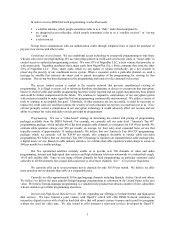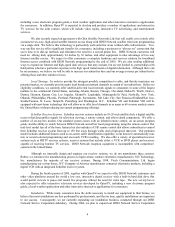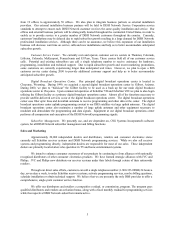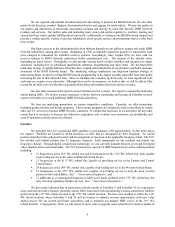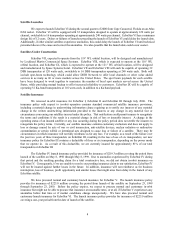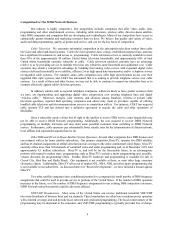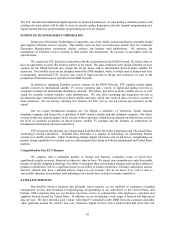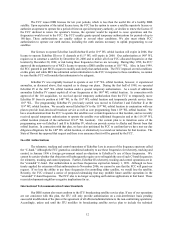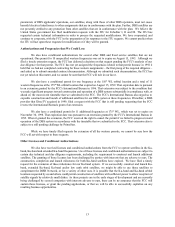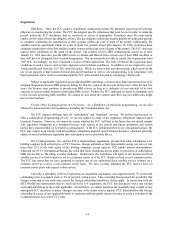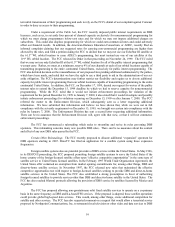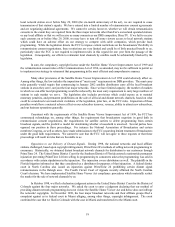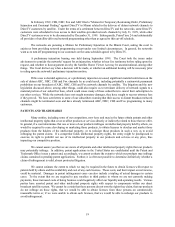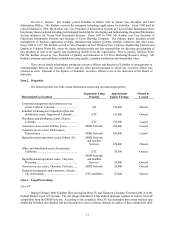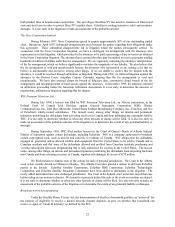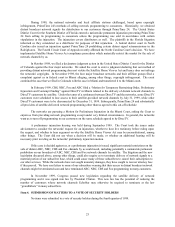Dish Network 1999 Annual Report Download - page 15
Download and view the complete annual report
Please find page 15 of the 1999 Dish Network annual report below. You can navigate through the pages in the report by either clicking on the pages listed below, or by using the keyword search tool below to find specific information within the annual report.13
parameters of DBS applicants’ operations, our satellites, along with those of other DBS operators, must not cause
harmful electrical interference to other assignments that are in conformance with the plan. Further, DBS satellites are
not presently entitled to any protection from other satellites that are in conformance with the plan. We believe the
United States government has filed modification requests with the ITU for EchoStar I, II and III. The ITU has
requested certain technical information in order to process the requested modifications. We have cooperated, and
continue to cooperate, with the FCC in the preparation of its responses to the ITU requests. We cannot predict when
the ITU will act upon these requests for modification or if they will be granted.
Authorizations and Frequencies that We Could Lose
We also have conditional authorizations for several other DBS and fixed service satellites that are not
operational. One permit for 10 unspecified western frequencies was set to expire on August 15, 1995. Although we
filed a timely extension request, the FCC has deferred a decision on that request pending the FCC’s analysis of our
due diligence for that permit. The FCC has not yet assigned the frequencies related to that permit because in 1992 it
held that we had not completed contracting for these western assignments – the first prong of the required diligence –
and asked us to submit amended contract documentation. Although we submitted such documentation, the FCC has
not yet ruled on this matter, and we cannot be sure that the FCC will rule in our favor.
We also have a conditional permit for one frequency at the 110° WL orbital location and a total of 11
western frequencies at the 175° WL orbital location that expired on August 15, 1999. That expiration date is pursuant
to an extension granted by the FCC’s International Bureau in 1996. That extension was subject to the condition that
we make significant progress toward construction and operation of a DBS system substantially in compliance with, or
ahead of, the most recent timetable that we submitted to the FCC. The FCC’s International Bureau also urged us to
expedite construction and launch of additional satellites for our DBS system at these frequencies. PrimeStar, a DBS
provider that DirecTV acquired in 1999, filed a request with the FCC that is still pending requesting that the FCC
reverse the International Bureau’s grant of an extension.
We also have a conditional permit for 11 additional frequencies at 175° WL, which was set to expire on
November 30, 1998. That expiration date was pursuant to an extension granted by the FCC’s International Bureau in
1995. When it granted the extension, the FCC reserved the right to cancel the permit if we failed to progress toward
operation of the DBS system in accordance with the timetable that we submitted to the FCC. That extension also is
subject to a still pending challenge by PrimeStar.
While we have timely filed requests for extension of all the western permits, we cannot be sure how the
FCC will act with respect to these requests.
Other Licenses and Conditional Authorizations
We also have received licenses and conditional authorizations from the FCC to operate satellites in the Ka-
band, Ku-band and extended Ku-band frequencies. Use of those licenses and conditional authorizations are subject to
certain due technical and due diligence requirements, including the requirement to construct and launch additional
satellites. The granting of those licenses has been challenged by parties with interests that are adverse to ours. The
construction, completion and launch milestones for both Ku-band satellites have expired. We have filed a timely
request for the extension of these milestones for our Ku-band system. If we successfully construct and launch Ku-
band, extended Ku-band, Ka-band and/or low earth orbit satellites, we might be able to use those satellites to
complement the DISH Network, or for a variety of other uses. It is possible that the Ku-band and Ka-band orbital
locations requested by us and others could permit construction of satellites with sufficient power to allow reception of
satellite signals by relatively small dishes. As these projects are in the early stages of development and are currently
being challenged by several companies with interests adverse to ours, there can be no assurance that the FCC will
sustain these licenses, or grant the pending applications, or that we will be able to successfully capitalize on any
resulting business opportunities.


